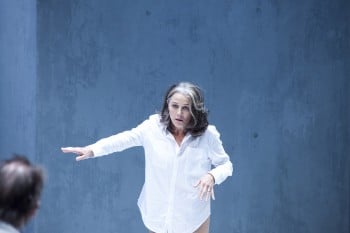Fury – Sydney Theatre Company
Joanna Murray-Smith debuts her newest work at STC this season, and Fury is her first play specifically commissioned by the company. A family drama that moves from soft to sharp focus on each of its characters, the resulting picture is a little blurry, but the plans are all there, and there’s a solidity to its structure that’s appealing.

That promise is never quite achieved, because it might perhaps reach a little too high. The intellectual, left-leaning liberal family, bastions of social justice and writing and research and reading, speak a little too much like their lines have been written for them in advance (almost sitcom syndrome – no one’s that switched-on) and are a little to exultant of all things perfectly middle-class, but even that can be forgiven in theatre’s heightened states of being.
There are some clunky examples of stereotyping that strike precisely when it seems like the author has tried not to stereotype; a working-class set of parents are broad and not shaded with anywhere near the sensitivity of the more privileged leads.
The main problem, though, is that while this is a family drama – the peaceful family shattered when the liberal family’s teenage son graffitis a mosque – in the latter half of the play it becomes about the mother’s own radicalism in a sort of nature/nurture exploration. Is the son rebelling against his parents, or becoming his parents? That’s all well and good, but in the structure of the play and its plaintive confession scenes, I think most in the audience would rather be back with the son and the mosque desecration, trying to unpack the drama from his perspective.
If the story lacks, the production values do not. Director Andrew Upton has one of the keenest eyes in theatre; his work, especially in tandem with lighting designers Nick Schlieper and ChrisTwyman is sharp and poignant, and the beats in Murray-Smith’s story are well-contained by Upton’s wry and caring hand.
Harry Greenaway as Joe, the son played the part of the rebelling son perfectly; with equal parts entitlement and derision towards his lifestyle, he was a wonderful combination of his comfortable, affable father Patrick (Robert Menzies) and driven, relentless mother Alice (Sarah Peirse).

Peirse too makes the play her showcase, particularly as her own life is put under the microscope. A strong and exceedingly watchable actor, she almost manages to convince you to look past the occasionally-limping plot into her soul, and for that she should be admired.
Fury is a play that loves its characters. If you can love them too, you’ll find the experience of seeing the play rewarding.


Have to agree with this review. Fury is very disappointing and it really omens down to the cliched, self conscious, upper middle-class script. The radicalism is particularly poorly portrayed and at its key point relies on the hoary old chestnut that radical leaders were both good-looking and smart and could make a woman do anything. I was there: most of them weren’t and most women didn’t. And there is even worse but I won’t reveal it just in case you waste your time seeing this stilted, lengthy play. My advice is avoid.